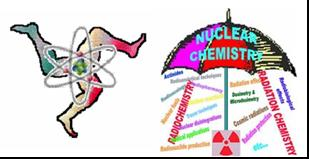Speaker
Dr
K. R. Kim
(Korea Atomic Energy Research Institute)
Description
Metal electrowinning is the process of winning metal ions from an electrolyte to a solid form on a cathode by passing an electric current through the electrolyte. In the uranium electrowinning literature, only a limited number of multiphysics modeling studies have been taken place for the comprehensive understanding of the complexity in this process. A computational electrochemo-fluid dynamics model has been developed to describe the electrowinning separation behavior in an electrolyte stream through the planar electrode cell system. Multiple electrochemical reactions of uranium electrowinning process from a molten-salt electrolyte stream were modeled to illustrate the details of the flow-assisted mass transfer of ions to the cathode. The electrochemo-fluid dynamics that occurs in the electrolyte space between the planar electrode in uranium electrowinning cell were simulated using a computational fluid dynamics (CFD) platform. This model solves for the fluid phase of electrolyte using the Navier-Stokes equations in a CFD framework. The simulation includes the mass transport of the ionic species and associated electrochemical kinetics under laminar electrolyte flow condition. This approach was taken into account the concentration profile at the electrode surface, to represent the variation of the convective diffusion-limited current density as a function of the flow characteristics and of applied current density. It was able to predict conventional current-voltage relation in addition to details of electrolyte fluid dynamics and electrochemical variable, such as flow field, species concentrations, potential, and current density distributions throughout the cell driven by applying a constant current.
Author
Dr
K. R. Kim
(Korea Atomic Energy Research Institute)
Co-authors
Dr
D. H. Ahn
(Korea Atomic Energy Research Institute)
Prof.
I. S. Hwang
(Seoul National University)
Mr
J. Y. Park
(Seoul National University)
Dr
S. Paek
(Korea Atomic Energy Research Institute)
Dr
T. J. Kim
(Korea Atomic Energy Research Institute)
